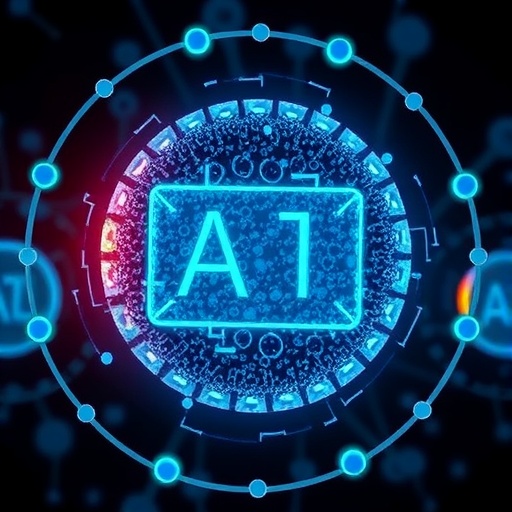Researchers at the New Jersey Institute of Technology (NJIT) have embarked on a groundbreaking journey to revolutionize energy storage by leveraging artificial intelligence to identify sustainable alternatives to lithium-ion batteries. The transition from conventional lithium-ion technology toward more sustainable battery solutions is not merely an improvement but a necessity given the increasing global energy demands and the diminishing availability of lithium resources. The work led by Professor Dibakar Datta represents a significant leap forward in this endeavor.
The research, recently published in Cell Reports Physical Science, highlights a transformative application of generative AI techniques in the field of battery development. This innovative approach enables rapid discovery of new porous materials that can facilitate the use of multivalent ions, offering a potential replacement for existing lithium-ion technologies. The reliance on abundant, non-toxic elements such as magnesium, calcium, aluminum, and zinc, instead of lithium, enhances the feasibility and sustainability of these new battery solutions. Such alternatives are critical in the face of looming supply chain challenges associated with lithium-ion batteries, which have dominated the market due to their energy density and proven efficacy.
In contrast to traditional lithium-ion batteries that utilize singly charged lithium ions, multivalent-ion batteries operate with ions that possess two or three positive charges. This fundamental difference allows multivalent-ion batteries to potentially achieve significantly higher energy storage capacities. However, the size and charge complexity of these multivalent ions create challenges in efficiently accommodating them within battery materials. The research undertaken by the NJIT team aims to surmount these obstacles, a feat that is paramount for the practical application of multivalent-ion batteries.
Professor Datta points out that the real challenge is not the scarcity of promising battery chemistries but the impossibility of testing millions of potential material combinations using traditional laboratory methods. This limitation underscores the advantage of employing generative AI, which offers a systematic and accelerated means to navigate through vast datasets of material properties and characteristics. By doing so, the researchers can focus on identifying the most promising candidates for multivalent batteries without the exhaustive trial-and-error approach that has historically hindered material discovery.
The NJIT team has engineered a dual-AI framework comprising a Crystal Diffusion Variational Autoencoder (CDVAE) and a finely tuned Large Language Model (LLM). This novel combination allows for a profound exploration of new crystal structures that hold promise for next-generation batteries. The CDVAE utilizes extensive datasets of existing crystal structures to hypothesize entirely new materials with diverse potential configurations, thus opening up the possibilities for discovering materials that were previously overlooked.
Simultaneously, the LLM is specifically tuned to identify materials that are thermodynamically stable, which is critical for the practical synthesis of these new structures. This focused approach enhances the likelihood of successfully producing materials that can withstand the rigors of real-world application, addressing one of the main hurdles in the transition to multivalent-ion technology. The combined capabilities of these advanced AI tools significantly expedite the material discovery process, ultimately leading to impactful innovations in energy storage.
The NJIT team’s efforts have yielded notable outcomes, including the identification of five new porous transition metal oxide structures with large, open channels. These structures are particularly well-suited for the rapid movement of bulky multivalent ions, marking a significant breakthrough in addressing the challenges associated with multivalent-ion battery technologies. The physicochemical characteristics of these new materials have been validated through rigorous quantum mechanical simulations and stability assessments, confirming their potential for successful experimental synthesis.
The implications of this research extend beyond simply developing new battery materials. By establishing a rapid and scalable methodology for exploring advanced materials, the NJIT team’s approach paves the way for innovations across various domains, including electronics, clean energy solutions, and beyond. The integration of artificial intelligence into materials science signifies a paradigm shift that equips researchers with powerful tools to uncover novel compounds that can transform numerous industries.
Looking ahead, Professor Datta and his colleagues are eager to collaborate with experimental laboratories to synthesize and thoroughly test the AI-designed materials. This partnership will mark the next phase of the project, bringing the theoretical discoveries into practical realms. Sharing knowledge between computational and experimental spheres is essential for bridging the gap between discovery and application, ensuring that these materials can ultimately transition from the lab to the market.
As this research advances, it not only addresses the immediate energy storage challenges but also sets a precedent for future explorations in material science. The potential for generative AI to uncover new compounds not previously imaginable unlocks a world of possibilities. Each new discovery contributes to a more sustainable and resource-efficient future, illuminating pathways to overcoming the pressing challenges of energy storage and utilization in the 21st century.
In summary, the NJIT team’s innovative work in utilizing AI for the discovery of porous materials stands to redefine the landscape of energy storage technologies. By focusing on multivalent-ion batteries, they are not only tackling the urgent need for alternative energy storage solutions but also charting a course toward a sustainable future that minimizes dependence on finite resources. The ongoing collaboration between AI and materials science heralds an era of accelerated discovery and application, opening doors to a myriad of possibilities for cleaner, greener technologies that can power the world for generations to come.
Subject of Research: Development of Sustainable Alternatives to Lithium-ion Batteries Using Generative AI Techniques
Article Title: Generative AI for discovering porous oxide materials for next-generation energy storage
News Publication Date: 26-Jun-2025
Web References: Link to the article
References: DOI: 10.1016/j.xcrp.2025.102665
Image Credits: Credit: New Jersey Institute of Technology
Keywords
Batteries, Artificial Intelligence, Porous Materials, Multivalent Ion Batteries, Energy Storage Solutions




